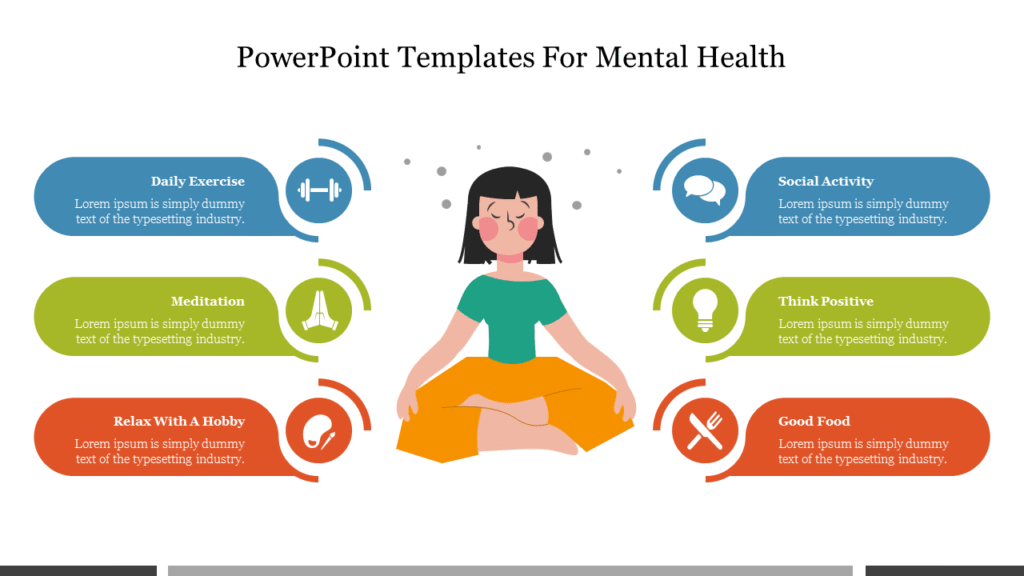1. Introduction to Mental Health
Mental health refers to our emotional, psychological, and social well-being. It influences how we think, feel, and act. Good mental health helps individuals cope with stress, work productively, and contribute to their community. Like physical health, mental health is vital for overall well-being.
*********************************************************************************
2. Importance of Mental Health Awareness
Mental health awareness promotes understanding and empathy. It helps reduce stigma and encourages people to seek help. Increasing awareness also leads to early diagnosis, better treatment outcomes, and overall improvement in quality of life.

********************************************************************************
3. Common Mental Health Disorders
Here are some common mental health disorders:
Mood Disorders
- Depression: Characterized by persistent sadness or low mood, loss of interest in activities, and changes in appetite or sleep patterns.
- Bipolar Disorder: Involves extreme mood swings, ranging from manic highs to depressive lows .
Anxiety Disorders
- Generalized Anxiety Disorder: Excessive and unshakeable worry, fear, or anxiety that interferes with daily life.
- Obsessive-Compulsive Disorder (OCD): Recurring, intrusive thoughts (obsessions) and repetitive behaviors (compulsions) that an individual feels compelled to perform .
Trauma-Related Disorders
- Post-Traumatic Stress Disorder (PTSD): Develops after experiencing a traumatic event, characterized by flashbacks, anxiety, or nightmares.
- Acute Stress Disorder: Similar to PTSD, but symptoms typically last for a shorter duration .
Personality Disorders
- Borderline Personality Disorder: Characterized by unstable relationships, emotional dysregulation, and impulsivity.
- Antisocial Personality Disorder: Involves a lack of empathy, disregard for others’ rights, and impulsivity .
Psychotic Disorders
- Schizophrenia: A chronic condition marked by distorted awareness, thinking, and perception, often accompanied by hallucinations and delusions .
Eating Disorders
- Anorexia Nervosa: Characterized by restrictive eating patterns, significant weight loss, and fear of gaining weight.
- Bulimia Nervosa: Involves binge eating followed by purging or compensatory behaviors.
- Binge Eating Disorder: Recurring episodes of excessive food consumption, often accompanied by feelings of guilt or shame .
Other Disorders
- Attention-Deficit/Hyperactivity Disorder (ADHD): Marked by symptoms of inattention, hyperactivity, and impulsivity.
- Substance Use Disorders: Involves the misuse of substances, leading to significant distress or impairment ².
*******************************************************************************
4. Symptoms and Warning Signs
Mental health symptoms and warning signs can vary depending on the individual and the specific condition. Here are some common signs to look out for:
Emotional Symptoms:
- Persistent Sadness or Low Mood: Feeling sad, empty, or hopeless for an extended period
- Excessive Worry or Fear: Uncontrollable worry about everyday issues or persistent fears
- Mood Swings: Rapid or extreme changes in emotions, such as irritability, anger, or euphoria
- Loss of Interest: Disinterest in activities or hobbies that once brought enjoyment
Behavioral Symptoms:
- Social Withdrawal: Avoiding friends, family, or social activities
- Changes in Sleep Patterns: Sleeping too much or too little, or experiencing disturbed sleep
- Substance Abuse: Using substances like alcohol or drugs to cope with emotions
- Risk-Taking Behavior: Engaging in impulsive or reckless behavior
**********************************************************************************
5. Causes and Risk Factors
Mental health problems can arise from:
- Biological factors: genetics, brain chemistry
- Life experiences: trauma, abuse
- Family history of mental illness
- Chronic medical conditions
- Substance abuse
***************************************************************************
6. Impact of Mental Health on Daily Life
Poor mental health affects:
- Work performance and productivity
- Relationships and communication
- Physical health
- Financial stability
- Decision-making abilities
*******************************************************************************
7. Myths and Misconceptions
- “Mental health issues are a sign of weakness.”
- “Only adults suffer from mental illness.”
- “You can just snap out of it.”
- “Therapy is only for serious problems.”
Dispelling these myths is essential for fostering a supportive environment.
******************************************************************************
8. Strategies for Mental Wellness
- Regular exercise
- Balanced diet
- Adequate sleep
- Mindfulness and meditation
- Journaling and creative expression
- Seeking professional help
9. Role of Family, Friends, and Community
Support systems can:
- Provide emotional comfort
- Encourage treatment adherence
- Reduce feelings of isolation
- Offer practical help in daily life
********************************************************************************
10. Mental Health in Schools and Workplaces
In Schools:
- Mental health curriculum
- Trained counselors
- Anti-bullying programs
In Workplaces:
- Mental health days
- Flexible work hours
- Access to therapy and wellness programs
**********************************************************************************
11. Government and NGO Initiatives
- National Mental Health Program (India)
- Mental Health First Aid (USA)
- World Health Organization campaigns
- NGOs like NAMI, Mind, and Sangath
**********************************************************************************
12. Using Technology for Mental Health Support
- Mobile apps for stress management
- Online therapy platforms
- AI chatbots for emotional support
- Social media awareness campaigns
**********************************************************************************
13. Conclusion
Mental health is just as important as physical health. Through awareness, education, and support, society can create an environment where individuals feel empowered to seek help without fear or stigma. Let’s talk about mental health openly and take steps toward a healthier future.
**********************************************************************************
Mental Health Presentation Mental Health Presentation Mental Health Presentation Mental Health Presentation , Mental Health Presentation , Mental Health Presentation ,, Mental Health Presentation ,,Mental Health Presentation,, Mental Health Presentation,, Mental Health Presentation
https://app.discoveryeducation.com/learn/player/34e88dd8-0025-48ad-8dc7-bea9b89d7e3d
https://pram123.com/mental-health-awareness-symptoms-causes-coping-tip/
++++++++++++++++++++++++++++++++++++++++++++++++++++++++++++++++++++++++++++++++++++++++++++++++++++++++++++++++++++++++++++++++++++++++++++++++++